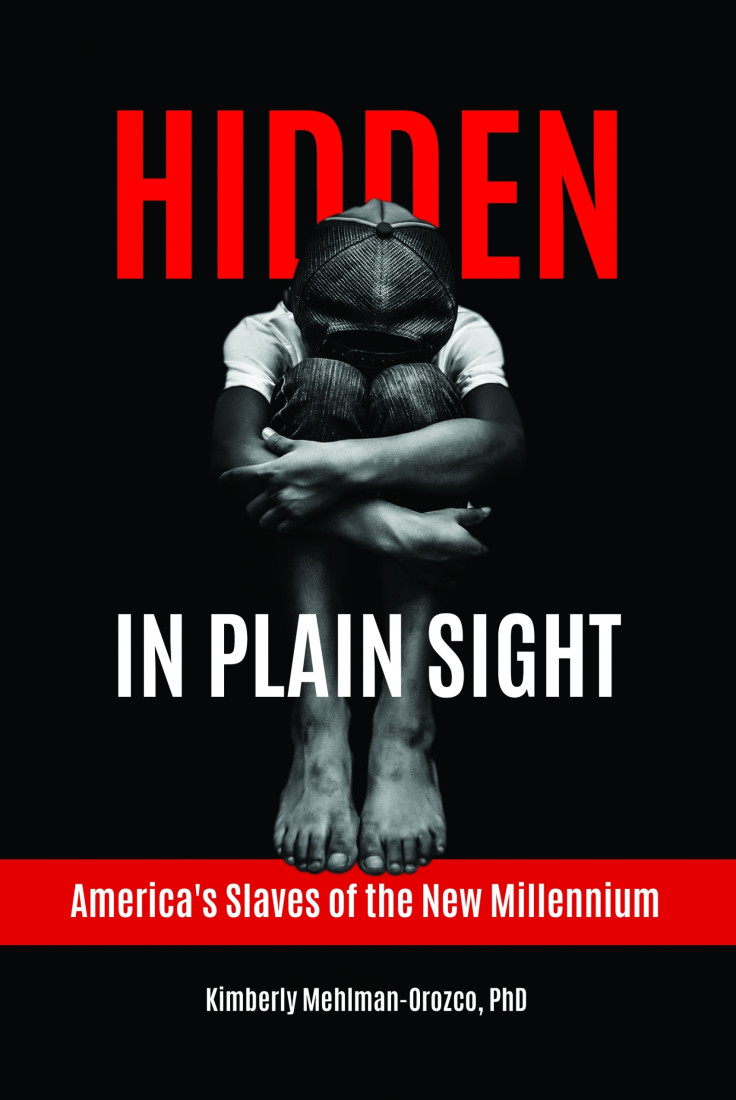Human trafficking: Why we are all guilty of supporting the modern slave trade
KEY POINTS
- Dr Kimberley Mehlman-Orozco is an expert in human trafficking.
- She told IBTimes UK about the bleak reality of how almost every industry is tarnished by slavery.
Dr Kimberley Mehlman-Orozco is one of the world's foremost experts on modern slavery. She has testified as an expert witness in court, rescued a woman who was in sexual servitude for 20 years outside a mall in Virginia, and spent a over a decade interviewing victims, perpetrators and consumers of slavery in an attempt to understand the $150bn industry.
And yet even she didn't realise that the nail salon near her home may have been a front for a brothel until she saw a young man enquire about a massage at the counter – a service that she had never seen advertised.
Alarmed by this possible red flag, she searched the name of the salon online. She discovered that men had claimed to receive sexual services at the parlour where she and her young daughter had often gone for manicures, on a website marketed as where "fantasy meets reality". She was later told that police were investigating the salon for possible commercial sex and trafficking.
This incident offered further proof to Mehlman-Orozco that the tendrils of human trafficking have invaded every aspect of our lives. Some 21 million people are believed to be victims of human trafficking across the world, be that forced prostitution or labour.
According to estimates by the International Labour Organisation, modern slavery is a billion dollar industry, only second to arms and drugs in terms of profits for criminals.
In her book, Hidden in Plain Sight: America's Slaves of the New Millennium, Dr Mehlman-Orozco documents harrowing accounts of slavery, the callousness of captors who were often also victims of abuse, and how we are all consumers of it - whether we visit brothels abroad or buy seemingly inexplicably cheap clothing.
IBTimes UK spoke to Dr Mehlman-Orozco about the most extreme case she has encountered, slavery red flags, and the industries where it is rife.

IBTimes UK: You say that most people have consumed a product or service involving labour by a victim of human trafficking. What are some forms of modern slavery that people might not be aware of that bleed into our daily lives?
Dr Mehlman-Orozco: They are numerous and they are all unique. With sex trafficking you have domestic sex trafficking, meaning individuals who are trafficked within the country they are a citizen of. Or where a person is imported from another country. There is gang controlled sex trafficking and sex trafficking within massage parlours.
Military sex trafficking involves personnel deployed abroad engaging in sex for sale near where they are being stationed. Then there is sex tourism, where adults and children are exploited by tourists. Mail order brides are another form.
Regarding labour trafficking, you have door to door salespeople, begging rings, and workers in nail salons. In the domestic servant industry people are forced into living in a home and cooking and cleaning in indentured servitude.
We also don't think about where our chocolate and textiles come from. In a lot of cases people are being labour trafficked and we don't realise why products are so cheap. It's because people are being exploited.
Undocumented migrants can be smuggled and find themselves in human trafficking situations once they arrive at their destination, like agricultural work where they are forced to pick tomatoes or other produce.
One type that my second book will cover is modern slavery and terrorism. A lot of people don't associate human slavery with Isis. This form of trafficking is manifesting itself within the extremist organisations, with child soldiers being put into exploitative situations by their parents.

You have interviewed dozens of victims as well as their captors. Are the perpetrators all stereotypical "evil villains" or is it more complicated than that?
They are often very intelligent, charismatic, and extremely kind when you interact with them, and this is across the board. They might not be formally educated but they have street smarts and converse in an intelligent way.
One trafficker that I interviewed called Dmitry Petrov was from Ukraine and trafficked girls to the US. He spoke four languages, quoted philosophy, and articulated himself like some of my grad students. He could be at a cocktail party and no one one would know he had a criminal background.
National Human Trafficking Awareness Day
- 11 January marks National Human Trafficking Awareness Day in the US. It was first observed in 2007.
- Between 2008 and 2010, the FBI investigated 2,515 suspected cases of human trafficking in the US.
- To raise further awareness, President Obama designated January as National Slavery and Human Trafficking Prevention Month in 2010.
But that facade faded over time. They can portray themselves as kind and gentlemanly, but six months later they become an entirely different person. Their language becomes more degrading, and they are more abusive in the interactions.
One sex trafficker I spoke to say said "I never let my left hand know what my right is doing". He was compartmentalising information and not allowing women to know the whole story.
Below: the words of a pimp that Dr Mehlman-Orozco interviewed from her book In Plain Sight
Why does a prostitute need a pimp? To guide her, to love her, to protect her. [...] To her, he is what Christ is to a Christian [...] Without him, there's no her. You must understand, a ho was put on earth to be pimped by her pimp
So, do traffickers realise they are manipulating people? Is there a moment when they think 'yes, I'm going to be a trafficker now'.
I get the sense that they do it with everyone they interact with. Their default is to manipulate whoever they talk to in a way that benefits them.
They are not trained but it's a skill they develop over time. Many traffickers are introduced to crimes or tactics at a young age, particularly in their teen years. Typically, they are introduced to various forms of crime as the children of sex workers or pimps or other criminals. The trafficker from Ukraine was the child of a mafia-involved businessman and he was groomed from a young age on how to manipulate people.
How can a victim be identified, then? In a recent Louis Theroux documentary, for instance, a woman was adamant she wasn't being trafficked even though she gave all her money to her pimp, and he was violent towards her. How can we know if a victim is a victim if they don't know themselves?
My book is actually used to train law enforcement officials in the US. One tool used by schools is to identify children that might have voids in their life and could be at high risk. Another tool of questioning is to ask what do you rely on for transportation? Where do you live? How much is in your bank account and can you access it? What do you do in your free time? Being unable to answer these conventional employment relations questions is a red flag indicator.
Of the dozens of victims and captors you have encountered, what is the most extreme case of human trafficking that you have seen?
I rescued one woman in front of a mall in a Virginia suburb. She had been trafficked for 20 years by her mother's drug dealer and had been shot in the leg at point blank range and required a vascular transfusion.
Law enforcement didn't intervene and the trafficker was never charged. She was arrested for prostitution, not her trafficker. And when she was rescued by me and others we had a hard time getting her access to services. The level of impunity the trafficker enjoyed was astonishing.
The case provided an insight into how many missed opportunities there are for intervention and what happens post-rescue. You see a lot of articles saying "victim rescued - offender arrested". But people don't realise that after the fact they are rarely convicted, or if they are it is for tangential crimes that carry light sentences. Victims are revictimised or erroneously criminalised by the system meant to protect them.
Some survivors of sex trafficking in particular say that the sex work is a problem and should be stopped, but you suggest that it should be decriminalised. Why is that?
I don't think sex work should be legalised and the reason being is sex tourism. I've looked at various countries including the FKK (Free Body Culture) clubs in Germany, and people say it's addressing and eliminating the criminal element. But there is no evidence to suggest that's true. Research shows that in places where sex work is legalised is creates a protective veneer that means law enforcement can't intervene.
I advocate decriminalisation so engaging in sex work would still be illegal, but penalties would be lighter and officers would be more inclined to use their discretion. This would empower victims fearful of criminalisation.
Who are the consumers of sex trafficking?
The demographic I have found is men with an MA and above. One of them I interviewed was a journalist, another was an attorney. One was a PhD-educated professor at a top rank university teaching finance and purchasing sex after his wife had cancer.
They aren't hiding in some shady corner. They are people who we are interacting with - they're our neighbours, family and friends that we interact with on daily basis. It's important to understand they are part of the problem as they are fuelling the demand.
Government officials and military and being stationed overseas have been known to brag about women they are purchasing sex from openly on the internet. For example, US military personnel bragging about purchasing sex from Asian women in Afghanistan. That is very surprising for most people to learn.
This article was amended on 11 January to make it clear that the nail salon was alleged to have been involved in possible commercial sex and trafficking.






















